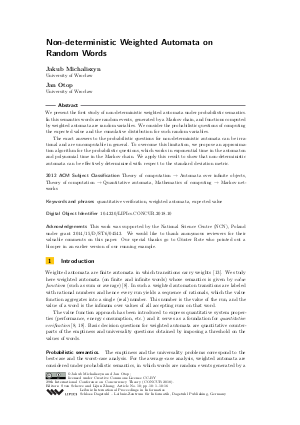Non-deterministic Weighted Automata on Random Words
Authors Jakub Michaliszyn, Jan Otop
-
Part of:
Volume:
29th International Conference on Concurrency Theory (CONCUR 2018)
Part of: Series: Leibniz International Proceedings in Informatics (LIPIcs)
Part of: Conference: International Conference on Concurrency Theory (CONCUR) - License:
 Creative Commons Attribution 3.0 Unported license
Creative Commons Attribution 3.0 Unported license
- Publication Date: 2018-08-31
File

PDF
LIPIcs.CONCUR.2018.10.pdf
- Filesize: 474 kB
- 16 pages
Document Identifiers
Subject Classification
ACM Subject Classification
- Theory of computation → Automata over infinite objects
- Theory of computation → Quantitative automata
- Mathematics of computing → Markov networks
Keywords
- quantitative verification
- weighted automata
- expected value
Metrics
- Access Statistics
-
Total Accesses (updated on a weekly basis)
0Document
0Metadata
Abstract
We present the first study of non-deterministic weighted automata under probabilistic semantics. In this semantics words are random events, generated by a Markov chain, and functions computed by weighted automata are random variables. We consider the probabilistic questions of computing the expected value and the cumulative distribution for such random variables. The exact answers to the probabilistic questions for non-deterministic automata can be irrational and are uncomputable in general. To overcome this limitation, we propose an approximation algorithm for the probabilistic questions, which works in exponential time in the automaton and polynomial time in the Markov chain. We apply this result to show that non-deterministic automata can be effectively determinised with respect to the standard deviation metric.
Cite As Get BibTex
Jakub Michaliszyn and Jan Otop. Non-deterministic Weighted Automata on Random Words. In 29th International Conference on Concurrency Theory (CONCUR 2018). Leibniz International Proceedings in Informatics (LIPIcs), Volume 118, pp. 10:1-10:16, Schloss Dagstuhl – Leibniz-Zentrum für Informatik (2018)
https://doi.org/10.4230/LIPIcs.CONCUR.2018.10
BibTex
@InProceedings{michaliszyn_et_al:LIPIcs.CONCUR.2018.10,
author = {Michaliszyn, Jakub and Otop, Jan},
title = {{Non-deterministic Weighted Automata on Random Words}},
booktitle = {29th International Conference on Concurrency Theory (CONCUR 2018)},
pages = {10:1--10:16},
series = {Leibniz International Proceedings in Informatics (LIPIcs)},
ISBN = {978-3-95977-087-3},
ISSN = {1868-8969},
year = {2018},
volume = {118},
editor = {Schewe, Sven and Zhang, Lijun},
publisher = {Schloss Dagstuhl -- Leibniz-Zentrum f{\"u}r Informatik},
address = {Dagstuhl, Germany},
URL = {https://drops.dagstuhl.de/entities/document/10.4230/LIPIcs.CONCUR.2018.10},
URN = {urn:nbn:de:0030-drops-95481},
doi = {10.4230/LIPIcs.CONCUR.2018.10},
annote = {Keywords: quantitative verification, weighted automata, expected value}
}
Author Details
References
-
Shaull Almagor, Udi Boker, and Orna Kupferman. What’s decidable about weighted automata? In ATVA, pages 482-491. LNCS 6996, Springer, 2011.

-
Benjamin Aminof, Orna Kupferman, and Robby Lampert. Reasoning about online algorithms with weighted automata. ACM Transactions on Algorithms (TALG), 6(2):28, 2010.

-
Christel Baier and Joost-Pieter Katoen. Principles of model checking. MIT Press, 2008.

-
Christel Baier, Stefan Kiefer, Joachim Klein, Sascha Klüppelholz, David Müller, and James Worrell. Markov chains and unambiguous büchi automata. In CAV 2016, pages 23-42. Springer, 2016.

-
Michael Benedikt, Gabriele Puppis, and Cristian Riveros. Regular repair of specifications. In LICS 2011, pages 335-344, 2011.

-
Udi Boker and Thomas A. Henzinger. Approximate determinization of quantitative automata. In FSTTCS 2012, pages 362-373. Schloss Dagstuhl - Leibniz-Zentrum fuer Informatik, 2012.

-
Krishnendu Chatterjee, Laurent Doyen, and Thomas A. Henzinger. A survey of stochastic games with limsup and liminf objectives. In ICALP 2009, pages 1-15, 2009.

-
Krishnendu Chatterjee, Laurent Doyen, and Thomas A. Henzinger. Quantitative languages. ACM TOCL, 11(4):23, 2010.

-
Krishnendu Chatterjee, Thomas A. Henzinger, and Jan Otop. Quantitative automata under probabilistic semantics. In LICS 2016, pages 76-85. ACM, 2016.

-
Krishnendu Chatterjee, Mickael Randour, and Jean-François Raskin. Strategy synthesis for multi-dimensional quantitative objectives. In CONCUR 2012, pages 115-131, 2012.

-
Edmund Clarke, Thomas Henzinger, Helmut Veith, and Roderick. Bloem. Handbook of Model Checking. Springer International Publishing, 2016.

-
Costas Courcoubetis and Mihalis Yannakakis. The complexity of probabilistic verification. J. ACM, 42(4):857-907, 1995.

-
Manfred Droste, Werner Kuich, and Heiko Vogler. Handbook of Weighted Automata. Springer, 1st edition, 2009.

-
William Feller. An introduction to probability theory and its applications. Wiley, 1971.

-
Jerzy Filar and Koos Vrieze. Competitive Markov decision processes. Springer, 1996.

-
Charles Miller Grinstead and James Laurie Snell. Introduction to probability. American Mathematical Soc., 2012.

-
Ashutosh Gupta, Corneliu Popeea, and Andrey Rybalchenko. Predicate abstraction and refinement for verifying multi-threaded programs. In POPL 2011, pages 331-344, 2011.

-
Thomas A. Henzinger and Jan Otop. Model measuring for discrete and hybrid systems. Nonlinear Analysis: Hybrid Systems, 23:166-190, 2017.

-
Andrew Hinton, Marta Z. Kwiatkowska, Gethin Norman, and David Parker. PRISM: A tool for automatic verification of probabilistic systems. In TACAS 2006, pages 441-444, 2006.

-
Alexander Kechris. Classical descriptive set theory, volume 156. Springer Science &Business Media, 2012.

- Daniel Krob. The equality problem for rational series with multiplicities in the tropical semiring is undecidable. Int. J. Algebr. Comput., 4(3):405-426, 1994. URL: http://dx.doi.org/10.1142/S0218196794000063.
-
Marta Z. Kwiatkowska, Gethin Norman, and David Parker. Quantitative analysis with the probabilistic model checker PRISM. Electr. Notes Theor. Comput. Sci., 153(2):5-31, 2006.

-
Christos H Papadimitriou. Computational complexity. Wiley, 2003.

-
Mickael Randour, Jean-François Raskin, and Ocan Sankur. Percentile queries in multi-dimensional markov decision processes. In CAV 2015, pages 123-139, 2015.

-
Leslie G. Valiant. The complexity of computing the permanent. Theor. Comput. Sci., 8(2):189-201, 1979.

-
Moshe Y. Vardi. Automatic verification of probabilistic concurrent finite-state programs. In FOCS 1985, pages 327-338. IEEE Computer Society, 1985.

